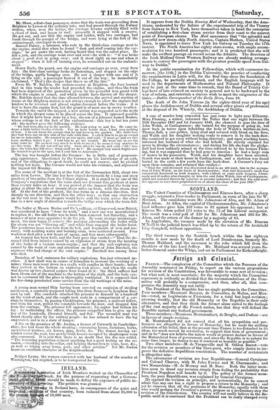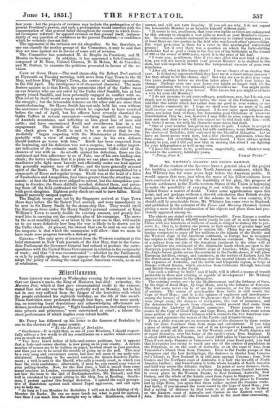lartigu an Cutuniul.
FRANCE.—The complexion of the Committee which the Bureaux of the Assembly nominated on Friday, to report on the various propositions for revision of the Constitution, was favourable to some sort of revision ; but what sort, is most uncertain ; for the majority which the Committee represents is evidently so divided that the recommendations of the Com- mittee will probably be a compromise, and then, after all, that com- promise the Assembly may not ratify.
The President of the Republic has no single partisan in the Committee. Four members—Messieurs Berryer, de Courcelles, de Melun, and Mou- lin—voted, as Legitimists or Fusionists, for a total but legal revision ; avowing frankly, that the old Monarchy or the Republic is their only alternative, and that they think the former alone suited to the feelings of the vast majority of the French nation, but that they will defend the Republic against any bastard government. Three members—Messieurs Montalembert, de Broglie, and Dufour —are in favour of simple revision.
M. Montalembert did not conceal that all his sympathies and pre- ferences are altogether in favour of Monarchy ; but he made the striking admission of his belief, that at the present time France is too disturbed in its ideas, too much moved by revolution, to support that form of government ; and as he " does not believe the nation would at present declare in favour of the Monarchical form of government, and since the Republic is to subsist for some time longer, he desires to see it rendered as bearable as possible."
Two other members—M. de Tocqueville and M. Odilon Barrot—vote for the revision as members of the 'fiers-parti, who simply desire to im- prove the defective Republican constitution. The number of revisionists is altogether nine.
The adversaries of revision are four Republicans—General Cavaignac and Colonel Charms, with M. Jules Favres and M. Charamaule ; and two Monarchists—M. de Mornay and M. Baze. Both the latter mem- bers seem to dread any revision simply from feeling the probability that President Napoleon will benefit by it. The policy of the former mem- bers, the pure Republicans, was explained by General Cavaignae. He opposed the revision on principle, and systematically, for he cannot admit that any one has a right to propose a return to the Monarchy ; and yet he observes that all the partisans of the Monarchy, equally with those who would prolong the President's powers, propose as a preliminary step the revision of the Constitution. The country will not really believe in the Re- public until it is convinced that the President can be easily changed every four years : but the projects of revision may include the prolongation of the present President's powers, and such a prolongation would interfere with the consummation of that general belief throughout the country to which Gene- ral Cavaignac referred : he opposed revision on that ground itself, indepen- dently of any question of conhdence in the present President,—a confidence which he certainly does not feel. The opponents of the revision are six altogether. So far, therefore, as one can classify the motley groups of the Committee, it may be said that they are nine against six in favour of some sort of revision.
The Committee has nominated M. de Broglie its President, and M. Moulin its Secretary. In addition, it has appointed a Sub-Committee, composed of M. Daze, Colonel Charms, M. de Melun, M. de Corcelles, and M. Dufour, to examine the petitions presented in favour of the re- vision.
CAPE or GOOD HOPE.—The mail steam-ship Sir Robert Peel arrived at Plymouth on Tuesday morning, with news from Cape Town to the 2d May, and from King William's Town, the centre of military operations, to the 23d April. The intelligence is of chequered character. The main feature against us is that Kreili, the paramount chief of the Caffre races on our frontier who are not ruled by the Gaika chief Sandilli, has at last openly joined Sandilli, and been personally engaged in conflict with us. This event by itself would seem to promise an indefinite prolongation of the struggle ; but the favourable features on the other side are more than counterbalancing. Sir Harry Smith has not only held his own without the assistance of the regular troops which he expected to have received before the end of April, but his officers have severely chastised the Gaika Coffees in several encounters—confining Sandilli to the range of Amatola mountains, and inflicting on him great loss of men and cattle ; and have encountered %relit and overthrown him in a set engagement. The details of this last feat are not received ; but the check given to Kreili is said to be so decisive that he im- mediately "began coqueting with the Missionaries at Butterworth, probably with a view of making out a case in his own defence should matters go worse with him. ' Kreili has been suspected from the beginning, and his defection was not a surprise, but a rather import- ant indication of the estimate made by a paramount Caffre chief of the chanets of war with us. As set-offs against his defection, there are the continued and firm adherence to us of Pato, one of his own leading clan chiefs ; the better reliance that it is plain we can place on the Fingoes, as auxiliaries who fight most bravely and efficiently under our lead against the generally superior race of Coffees ; and the more generally aroused spirit of the Boers. The defeat of Kreili was indeed accomplished by a commando of Boers and regular troops. Kreili was at the head of a force of Tambookies and Amagalekas, four times greater than the attacking com- mando : at first the Boers were obliged to retreat, but the Amagalekas pur- suing in disorder, the Boers skilfully recoiled, defeated them, and pursu- ing them off the field outflanked the Tambookies, and defeated them also, with great slaughter. Eighteen petty chiefs are said to have fallen. Kreili himself narrowly escaped capture. The English troops sent out by the Singapore arrived at Cape Town three days before the Sir Robert Peel arrived, and were immediately to be sent to Sir Harry Smith by the steam-ship Dee. They would swell the European force under Sir Harry Smith's personal command at King William's Town to nearly double its existing amount, and greatly for- ward him in carrying out the complete plan of his campaign. The news by the next monthly mail, or at latest by the next one to that, will enable us to see more definitely how long the war is likely to be drawn out by the Caffre chiefs. At present, the utmost that can be said on our side by the sanguine is that which the unsanguine will allow—that we seem to have made some progress towards a distant goal.
CANADA.—The only news of interest from the Western continent is the brief statement in New York journals of the 31st May, that in the Cana- dian Parliament the Governor-General had refused to produce the corre- spondence with the United States Government in relation to the reciprocity of trade ; and that " it was recommended"—whether by the Parliament, or only by public opinion, does not appear—that the Government should adopt the policy of dosing the canal against American vessels, as an act of retaliation.



























 Previous page
Previous page